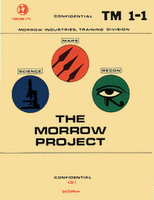 Everyone remembers their first character, right?
Everyone remembers their first character, right?Well, I certainly don't. I haven't got a damn clue who (or what) that character was. I don't even remember what system or setting my first-played RPG used. I have a funny feeling that it was probably The Morrow Project, and I'm sure we might've lasted most of the session before we were killed.
So, random memories of those early Morrow Project games...
I have a thought that my first character was a heavy gunner in a Recon squad, sitting in the turret of one of the V-150 armored cars that the MP was so fond of. At the time, the group I was playing with (my friend Will, his brother, and his brother's friends) had definitely played the game previously. Will's brother (we'll call him "Josh") was running the game. They explained to me that the mortality rate of gunners on V-150s was exceptionally high. So high, in fact, that Josh had introduced a house rule that all V-150's were issued a single flak jacket for use by the top gunner.
As you can see, we're off to a wonderful start so far.
I only recall this as being a one-session game, but it might have gone on for more than that. I remember encountering "snake eaters" (U.S. green berets, frozen and left to monitor the MP for the government) and "blue undead" (corpses animated by excessive radiation; not malicious, but deadly due to their innate radioactivity). Also remember encountering "maggots" (pale, mutated humans who lived underground, with stumpy limbs and cannibalistic appetites).
As for outcomes, well. I'm sure we died. I'm sure one (or more) of the encounters mentioned above was the cause of it. I do recall Josh messing with me, specifically; my character was on watch at night, and he noticed some movement in the underbrush. It turned out to be a skunk or something along those lines, a mundane creature, but I was very, very concerned up until I worked things out.
I also have memories of playing a medic in one of those Morrow Project games. We encountered some natives, one of whom was sick with (of all things) strep throat. I fixed him up, but remember wondering what the big deal was. Josh was obviously attempting to show that diseases that we might now consider to be mundane can be deadly serious business if antibiotics and other medicines aren't available.
As for the effects of these earliest of scenarios, let's put it into perspective. The Morrow Project was designed to be deadly. A weapon's damage, rated numerically in what was referred to as an "E-Factor," represented the number of inches of ballistic gel (or human flesh, take your pick) that a typical projectile of that size and power could penetrate.
Combine this with the fact that hits to different locations had different effects. You didn't just get shot in your torso; you got shot in one of four torso locations. Area 1 indicated the central chest, where most of your really vital organs are; Area 4 was the shoulders and outside ribs. A shot to Area 1 of any power had a pretty good chance of killing a character outright. Damage above a certain amount to an extremity resulted in amputation. All wounds resulted in blood loss, which meant that even a relatively small wound could still kill you if the bleeding wasn't controlled. Heck, one of a character's most important attributes was his blood type.
So the first games I played were lethal, combining modern military equipment with post-apocalyptic disaster. Was there any doubt that we would all be killed, one way or the other? As mentioned, I can't recall any single game lasting more than a single session, maybe two.
Thus, my penchant for realism. It also instilled a certain "kill or be killed" mentality, which was only reinforced by later scenarios and campaigns that used systems with comparativly moderate lethality. I could adapt, but those games set a certain tone that would define my style of play for quite some time. I still prefer gritty combat systems that provide for some possibility of instant death, no matter how slight. Fighting is a gamble, and there should be risks involved.
No comments:
Post a Comment